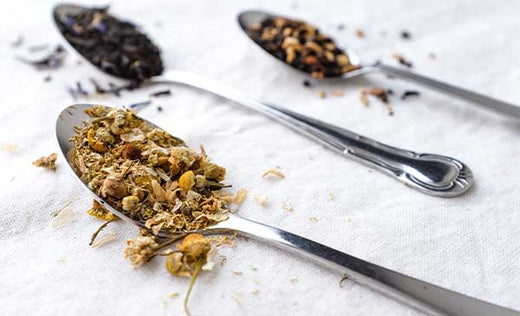Can You Eat Tea Leaves?

Tea, a beloved beverage worldwide, is known for its soothing properties and health benefits. But have you ever wondered if you can eat tea leaves?
The answer might surprise you.
Yes, you can eat tea leaves. In fact, consuming loose leaf tea leaves can offer a concentrated dose of the same health benefits you get from your brewed cup. From green tea leaves packed with antioxidants to the unique culinary uses of tea leaves, there's a lot to explore.
In this article, we'll delve into the nutritional value of tea leaves, their health benefits, and how you can incorporate them into your diet.
So, grab a fork (or spoon), tea lovers. We're about to embark on a flavorful journey beyond the teacup.
Seriously, are tea leaves edible?
Eating tea leaves might seem unusual at first. We're used to brewing them, not biting them. Yet, many cultures have embraced this practice for centuries. They find it both healthy and flavorful.
Tea leaves offer more than just taste, though. By consuming them, you absorb a greater variety of nutrients.
So, can you eat green tea leaves or any tea leaves, really? Absolutely. It's simply another way to fully enjoy their benefits.
The Nutritional Scoop: What's in a Leaf?
Tea leaves are more than just flavorful. They pack a powerful nutritional punch. Inside each leaf is a wealth of nutrients and compounds.
One key component is antioxidants. These molecules help fight free radicals in your body. Consuming them can protect against cell damage.
Nutritional Highlights in Tea Leaves:
- Catechins: Powerful antioxidants prevalent in green tea.
- Vitamins: Includes vitamin C and vitamin K.
- Minerals: Potassium and manganese come standard.
- Fiber: Supports digestion and satiety.
- L-theanine: Promotes focus and relaxation.
These components combined create a superb health-promoting package. It's not just about nutrients, though. Tea leaves also provide caffeine. It energizes and enhances alertness. Eating tea leaves ensures you get these benefits in their most concentrated form.
Overall, their nutritional profile contributes to a balanced diet. They are a small leaf with mighty benefits.
Green Tea Leaves: A Powerhouse of Antioxidants
Green tea leaves stand out in the world of tea. They're known for their high antioxidant content. This is mainly due to catechins.
Catechins are a type of polyphenol found in abundance. They're effective in reducing oxidative stress. This may help protect against various chronic diseases.
These leaves also offer other health bonuses. Regular consumption may boost metabolism. It's why they're often linked to weight management.
Moreover, green tea leaves can enhance mental clarity. L-theanine, another component, promotes calm focus. Together with caffeine, it supports cognitive performance.
Overall, green tea leaves are incredibly beneficial. They're not just a tea-time delight. They provide a comprehensive health boost.
Culinary Creations: Cooking with Tea Leaves
Tea leaves aren't only for sipping. They're also a versatile cooking ingredient. Adding them to dishes can elevate flavors.
The practice isn't new. Many Asian cuisines have long used tea leaves. From salads to desserts, the options are diverse.
When cooking with tea leaves, you unlock a world of taste. Savory dishes can benefit from their umami flavor. It's an unexpected but delightful twist.
Imagine a tender roasted chicken with a tea marinade. Incorporate a black tea or oolong tea into a rub for your barbeque ribeye. Or think of a creamy matcha-infused ice cream. All showcase the creativity tea leaves inspire.
Here's a quick list of culinary uses:
- Salads: Create a tea-infused dressing or sprinkle dried leaves for a crunchy texture.
- Soups: Infuse broth with a subtle aroma.
- Baking: Use tea leaves to flavor cakes and other baked goods.
- Marinades: Add complexity with brewed leaves. How about a chai-infused pot roast for dinner?
- Smoothies: Blend fresh leaves for a nutrient boost.
Experimenting with tea leaves can be fun. It's an invitation to explore new tastes. Next time you cook, consider trying this unique ingredient.

Can You Put Tea Leaves in a Drink?
Incorporating tea leaves into beverages is a popular practice. You can steep loose tea leaves in hot water to create a flavorful infusion, or you can blend them into smoothies for added nutrients.
Herbal teas can also make some interesting and delicious mocktails or cocktails!
Additionally, using powdered tea leaves like matcha in lattes or other drinks is a great way to enjoy their health benefits. Just ensure you start with high quality loose leaf tea leaves.

Matcha: The Edible Tea Trend
Matcha has taken the world by storm. This vibrant green powder isn't just for drinks. It's a versatile ingredient in cooking and baking.
Unlike other teas, matcha is whole leaves that are ground to a fine powder. (If you love matcha, you may have been eating green tea leaves all along!) It's a concentrated source of nutrients, antioxidants and amino acids.
In Japan, matcha is a tradition. Used in tea ceremonies, it's cherished for its earthy taste. Now, it's a global culinary trend.
You can incorporate matcha in various ways. Think smoothies, lattes, or even cookies. Each adds a unique flavor, making matcha a favorite among food enthusiasts.
Health Benefits of Eating Tea Leaves
Eating tea leaves offers a range of health benefits that might surprise you. Tea leaves are packed with antioxidants. These compounds help combat oxidative stress in the body.
Consuming tea leaves whole provides more nutrients than brewed tea. Vitamins like vitamin C and vitamin K are more abundant in the leaves. Minerals such as potassium and manganese are also present.
Tea leaves can support your metabolism. They contain compounds that may aid in weight management. Additionally, the fiber in tea leaves can improve digestion.
Let’s highlight some key benefits:
- Rich in Antioxidants: Helps fight free radicals.
- Boosts Metabolism: Aids in weight management.
- Supports Digestion: Fiber content enhances gut health.
Moreover, the amino acid L-theanine promotes relaxation. It can improve mental focus when paired with caffeine. This unique combination is found naturally in tea leaves.
Overall, tea leaves are a nutritious addition to a balanced diet. Their benefits extend beyond what you get from just sipping tea.
What Would Happen If You Eat Old Tea Leaves?
Just like drinking expired tea, old tea leaves kept beyond the expiration date may simply have lost some of their flavor and aroma, as well as nutritional value. If they have been stored improperly, they may have developed a stale taste, which can be unappetizing.
In terms of safety, if you have been storing the tea properly and it shows no signs of mold or spoilage, older teas are likely safe to consume. However, consuming old tea leaves may not provide the same health benefits as fresh ones, as antioxidants and other nutrients degrade over time. So it is a good idea to start with tea that is fresh.
Conclusion: Embracing Tea Leaves in Your Diet
Eating tea leaves can open up a world of flavors and benefits. This age-old practice blends taste with tradition, inviting you to explore its potential. Consider adding tea leaves to your meals for a unique twist. As you savor their rich history and health perks, you'll enjoy more than just a cup.









